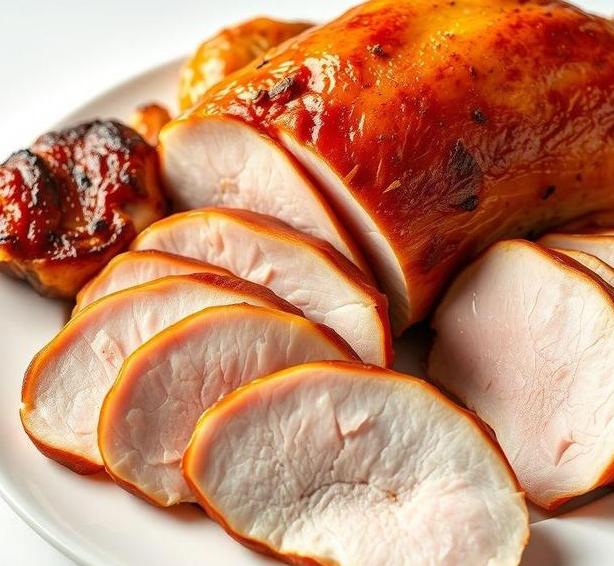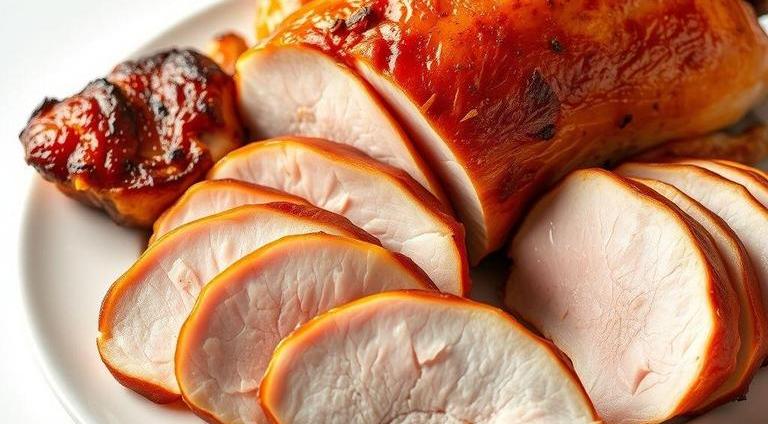Turkey is a staple in many households, particularly around the holidays, but its versatility means it often gets cooked and consumed year-round. Whether it’s for a hearty family dinner, sandwiches, or used in soups and salads, turkey parts like wings, breasts, thighs, and legs offer a lot of variety. However, just like any meat, turkey parts are perishable and need to be handled and stored properly to ensure they remain safe to eat.
One of the common questions turkey lovers ask is whether turkey parts can go bad, and if so, how to tell when they’re no longer safe to eat. The answer is yes, turkey parts can indeed spoil, and understanding the signs, shelf life, and proper storage techniques is crucial for keeping your meals safe and delicious.
In this guide, we’ll walk through everything you need to know, from identifying spoilage to tips for storing and extending the life of your turkey parts. By the end, you’ll have all the tools and knowledge you need to make sure your turkey stays fresh and safe.
Can Turkey Parts Go Bad?
Yes, turkey parts-just like any meat-can go bad, and this is important to understand because spoiled turkey can be dangerous to consume. There are multiple factors at play when determining whether or not turkey parts are still safe to eat. The primary contributors to spoilage include:
- Bacterial Growth: When turkey parts are left in the “danger zone” (40°F to 140°F or 4°C to 60°C), bacteria like Salmonella or Campylobacter can multiply rapidly. These pathogens can cause foodborne illnesses, leading to symptoms like nausea, vomiting, diarrhea, and fever.
- Enzymatic Breakdown: Even in the fridge, enzymes naturally present in turkey parts will begin breaking down the meat, leading to changes in texture and flavor over time.
- Oxygen Exposure: Once turkey parts are cut, they are exposed to oxygen, which accelerates spoilage. Oxidation causes the meat to discolor, develop off smells, and degrade in quality.
So, while turkey parts can definitely go bad, recognizing the early signs and following proper storage methods can help extend their shelf life.
Shelf Life For Turkey Parts

Knowing how long turkey parts will last depends largely on their form (raw or cooked) and how they are stored. Below is a breakdown of typical shelf lives for different types of turkey parts.
Raw Turkey Parts
-
Refrigerated Raw Turkey Parts
- Shelf life: 1-2 days
- If you’re planning to use raw turkey parts, it’s important to cook them as soon as possible. Storing them in the refrigerator in an airtight container or securely wrapped will help prolong their freshness.
-
Frozen Raw Turkey Parts
- Shelf life: 9-12 months
- Freezing turkey parts can significantly extend their shelf life, but once frozen, they should be cooked within a year for the best flavor and texture. After this time, the quality may start to degrade, but they’re still safe to eat.
Cooked Turkey Parts
-
Refrigerated Cooked Turkey Parts
- Shelf life: 3-4 days
- Once turkey parts have been cooked, they need to be refrigerated promptly in order to prevent bacterial growth. Always store leftovers in airtight containers to preserve flavor and safety.
-
Frozen Cooked Turkey Parts
- Shelf life: 2-6 months
- If you can’t finish your cooked turkey within a few days, freezing is a good option. Keep in mind, the texture of the meat may change slightly once thawed, but it will still be safe to consume if stored properly.
Ground Turkey
-
Refrigerated Ground Turkey
- Shelf life: 1-2 days
- Ground turkey has a much shorter shelf life than whole cuts, so it should be used within 1-2 days of purchase or frozen immediately.
-
Frozen Ground Turkey
- Shelf life: 3-4 months
- Freezing ground turkey helps preserve its freshness, but for optimal flavor and texture, use it within 3-4 months.
Common Signs Of Spoilage
Sometimes, turkey parts look fine, but how do you know they are still safe to eat? Spoilage can sometimes be subtle, so it’s important to pay attention to the following signs:
-
Smell
- Fresh turkey should have a mild, neutral odor. If it smells sour, rotten, or overly pungent, it has likely gone bad. Any off-putting smell is a red flag, and the turkey should be discarded.
-
Texture
- Fresh turkey parts should feel firm, moist, and slightly tacky. If the meat feels slimy, sticky, or mushy, that’s a sign that bacterial growth may have occurred, and the turkey should not be consumed.
-
Color
- Fresh turkey is typically light pink with a slight translucent quality. If the meat has turned a grayish or greenish hue, it’s a strong indicator that spoilage has set in. A discoloration around the bones or fatty tissue could signal the onset of rot.
-
Excessive Liquid
- If you notice that the packaging has excessive liquid or that the turkey part is submerged in a watery substance, it could be a sign that the meat is breaking down. While some moisture is normal, an unusually large amount could indicate spoilage.
-
Packaging Integrity
- Pay attention to the condition of the packaging. If the vacuum-sealed bag is punctured or leaking, it could have allowed bacteria to enter, leading to faster spoilage.
How To Store Turkey Parts?

Proper storage is key to maintaining the quality and safety of turkey parts. Here’s a detailed look at how to store them based on whether they’re raw or cooked:
Storing Raw Turkey Parts
-
Refrigeration
- Keep raw turkey parts in their original packaging if unopened. If opened, transfer them to an airtight container or wrap them tightly in plastic wrap or foil. Store them on the bottom shelf of the fridge to avoid contamination from any drips.
-
Freezing
- For longer storage, wrap raw turkey parts tightly in plastic wrap or freezer-safe bags. Be sure to press out excess air before sealing to prevent freezer burn. You can also use heavy-duty aluminum foil or vacuum-sealed bags for an extra layer of protection.
-
Labeling
- Always label frozen turkey with the date of freezing so you can easily track its storage time. This helps ensure you use it within the recommended time frame for best quality.
Storing Cooked Turkey Parts
-
Refrigeration
- After cooking, let the turkey cool to room temperature for no more than 2 hours before refrigerating. Place the meat in an airtight container or wrap it tightly in foil or plastic wrap. This will keep the turkey moist and prevent it from absorbing odors from other foods.
-
Freezing
- For long-term storage, cooked turkey parts can be frozen. Like raw turkey, make sure to tightly wrap cooked parts and remove as much air as possible. You can also consider slicing the turkey into portions to make future meals easier to prepare.
Expert Tips
-
Defrosting Turkey Safely
- Always defrost turkey parts in the fridge, never at room temperature. It may take 24 hours for every 5 pounds of turkey to fully thaw. If you’re in a rush, use the cold water method (submerge the turkey in its original packaging in cold water, changing the water every 30 minutes).
-
Don’t Leave Turkey Out Too Long
- Avoid leaving turkey parts out at room temperature for more than 2 hours (or 1 hour if it’s hot outside). This allows bacteria to grow quickly, increasing the risk of foodborne illness.
-
Use A Meat Thermometer
- If you’re unsure whether turkey parts are cooked through, use a meat thermometer. The internal temperature should reach 165°F (74°C) to ensure it’s safe to eat.
-
Freeze In Portions
- If you have leftover turkey, freeze it in smaller portions. This allows for quicker thawing and better meal prep flexibility.
FAQs
How Can I Tell If Turkey Parts Have Gone Bad?
You can tell if turkey parts have gone bad by checking for a sour or unpleasant odor, a slimy or sticky texture, or discoloration. If the turkey parts appear dry or have a greenish or grayish hue, they may be spoiled.
How Long Can Turkey Parts Stay Fresh In The Fridge?
Raw turkey parts can stay fresh in the fridge for 1-2 days, while cooked turkey parts typically last for 3-4 days. Always ensure the turkey is stored in an airtight container to maintain its freshness.
Can Turkey Parts Go Bad If Left Out At Room Temperature?
Yes, turkey parts can go bad if left out at room temperature for more than 2 hours. Bacteria can rapidly multiply at temperatures between 40°F and 140°F, increasing the risk of foodborne illness.
How Should Turkey Parts Be Stored To Prevent Them From Going Bad?
Turkey parts should be stored in an airtight container or tightly wrapped in plastic wrap or aluminum foil in the refrigerator. If you’re not using them within a couple of days, freezing them is the best option to prevent spoilage.
Can Frozen Turkey Parts Go Bad?
Yes, frozen turkey parts can go bad if they are stored improperly or for too long. Although they remain safe to eat indefinitely in the freezer, their quality deteriorates over time. For best quality, turkey parts should be consumed within 6 months of freezing.
What Is The Best Way To Thaw Turkey Parts Safely?
The safest way to thaw turkey parts is by placing them in the refrigerator for several hours or overnight. You can also thaw them in cold water, changing the water every 30 minutes, or use the microwave for a quicker option, but cooking immediately after thawing is recommended.
How Long Does Cooked Turkey Stay Good In The Fridge?
Cooked turkey can stay good in the fridge for 3-4 days if stored in an airtight container. Always refrigerate cooked turkey within two hours of cooking to prevent bacterial growth.
Can I Eat Turkey Parts After The Expiration Date?
While the expiration date provides a guideline for safety, it’s important to also assess the turkey’s smell, texture, and appearance. If it has a foul odor or any signs of spoilage, it should not be consumed, even if it’s within the expiration date.
Can Turkey Parts Go Bad In The Freezer?
Turkey parts can go bad in the freezer if they are not properly wrapped or if they are stored for too long. Over time, frozen turkey parts can develop freezer burn, which affects their texture and flavor, though they remain safe to eat.
What Is The Shelf Life Of Turkey Parts In The Refrigerator?
The shelf life of raw turkey parts in the refrigerator is typically 1-2 days, while cooked turkey parts can last up to 3-4 days. Always check for signs of spoilage, such as off smells or changes in texture.